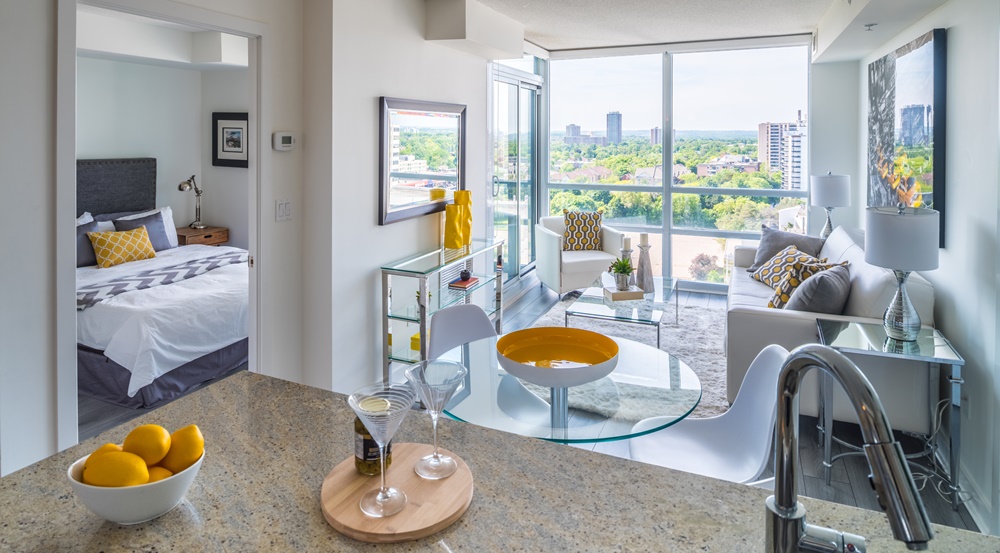
Mr. Phanom Kanjanatheimthao, Managing Director of Knight Frank Thailand said that the Bangkok condominium market continued to slow down with a decrease in demand from buyers including both locals and foreigners.
Property developers are exercising caution when launching new projects, and have been adjusting their plans to better suit the economic conditions. Many listed developers reported a decrease in the value of condominium presales during the first half of 2019. The speculative demand will decrease due to the market cooling. Demand from foreigners is weak due to the rise of the baht against the yuan and US dollar, the unpredictability of the US-China Trade row and the global economic slowdown. We do not expect the selling prices of condominiums to drop, as we do not see the possibility of a decline in land prices.
Supply
According to Knight Frank Thailand Research, the Bangkok condominium supply during the first half of 2019 amounted to 594,453 units, of which around 27,870 units were launched in the first half of 2019, decreasing by 19% compared to the newly launched during the same period last year. It is estimated that the new condominium launches for the full year will probably level off at 50,000 units, down 27% from the previous year. Approximately 74% of all newly launched units are from listed developers. The majority of new launches were still in the peripheral Bangkok area, representing 53% of 1H 2019’s new supply, followed by the city fringe and CBD areas, representing by 32% and 15%, respectively. Of all condominium units launched in the first half, 55% were in areas along the operating mass-transit lines, whilst 42% were in areas along mass-transit lines under construction. This reflects a tendency of developers to stick to areas with good infrastructure and amenities where chances of sales are reasonably good. As well, high land costs along transit lines make any kind of development other than high-rise buildings economically unviable. Areas along underconstruction transit lines or extensions are becoming more attractive to developers and buyers, as land costs are still reasonable, and quality condominiums can be had for less than THB 120,000 per square metre.
Graph 1
Supply & New Supply of Bangkok Condominium, 2010 – 1H 2019

Graph 2
New Supply by Location, 1H 2019

Demand
There were approximately 501,638 condominium units sold out of 594,453 units, representing the sold rate of 84%, which is stable from the end of 2018. Meanwhile, the number of unsold condominium units continues to climb; there are approximately 92,815 unsold units, For the newly launched of 27,870 units during the first half of 2019, there were only 5,257 condominium units sold, representing the sold rate of only 19% of total newly launched during the first half of 2019. The second-quarter sales rate for newly launched condominium dropped from 22.6% in the first-quarter of 2019 to 15.7% in the second quarter-was an all-time low. The sales rate for new condominium launched in Bangkok during the first half of 2019 fell to historic lows as loan-tovalue (LTV) limits, a weak economy and stronger baht dampened demand. The normal quarterly sales rate for new condominium launches is around 40-50%. Tougher loan-to-value (LTV) requirements from the Bank of Thailand are also starting to have an impact. The appreciation of the baht against the US dollar and the yuan had also impacted demand for residential properties from foreign investors, resulting in a drop in bookings during the second quarter of this year. The property market is going through a hard period with both domestic and overseas demand dropping as a result of the LTV coming into effect and the baht appreciation. The LTV policy that Bank of Thailand hoped would put a brake on condominium speculators had a strong impact on real buyers in not just Greater Bangkok, but also in the provinces. Developers have shifted to launching more low-rise residential projects like single detached houses, semi-detached houses and townhouses, as condominium activity plummeted in the first half. Developers that keep launching new condominiums into the supply will find it more difficult, as the sales rate is not as good as expected and will result in a large amount of inventory.
Graph 3
Supply, Demand & Sold Rate of Bangkok Condominium, 2010 – 1H 2019

Graph 4
Supply, Demand & Sold Rate of Newly Launched Condominium in Q1 & Q2 2019

Pricing
The asking prices of condominium projects continued to climb throughout Bangkok but at different paces, depending on the location. The average selling price of condominiums in the CBD was at THB 267,281 per square metre, increasing by 2.5% from the end of 2018. This was followed by the average selling price of city fringe condominiums, increasing by 2% to THB 148,466 per square metre, and the average selling price of condominiums in the peripheral area of Bangkok, which increased by 1.5% to THB 80,312 per square metre. Though, the asking price increased in every location, the developers offered the discount. There are more and high promotion/discount during the negotiation. Some projects offered the discount up to 20% from the asking price. Price wars in Bangkok’s condominium market began in the middle of the year.
Graph 5
Average Selling Price of Bangkok Condominium, 2010 – 1H 2019

Outlook
The outlook of Bangkok condominiums for the rest of the year is still unclear. To boost sales in the second half of the year, most property firms have launched promotional campaigns and collaborations with strategic partners to offer purchasers more for their money. There are still opportunities for new developments, but it will be a much more challenging environment driven by end user purchasers. The situation will diminish buy-to-rent purchasers, given low rental yields and the lack of growth in expatriate tenant numbers.
However, we believe that the introduction of the new land tax, which will be effective in 2020, will have less effects on condominium buyers due to the fact that the tax charge is not that much. We expect the number of new condominium launches in 2019 will slow down as developers will delay new project launches as well as slow new development site acquisitions to focus on clearing unsold condominium units. Several developers will offer discount and special offer campaigns to sell both completed units as well as the units under construction.













